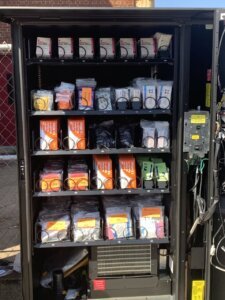The D.C. government will roll out harm-reduction vending machines that give access to lifesaving medicine and other wellness products.
DC Health, in partnership with the Department of Behavioral Health and D.C. Fire and EMS, said that these vending machines will provide lifesaving tools such as naloxone, Narcan and fentanyl test strips, along with hygiene and wellness products.
This type of machine is becoming more common in cities across the country due to the rise in opioids usage and overdoses, and their ability to provide access to critical services that will help the people who need it most.
In October 2021, DC Health awarded grants to the Family and Medical Counseling Services and HIPS harm reduction services to start the implementation of the vending machines in the District.
“This pilot project will evaluate the utilization patterns and positive impact these products have on the well-being of vulnerable communities in the area,” DC Health said in a news release.
Four of the planned six machines have been placed in areas the department deems as having “higher than average rates of drug overdose and unhoused populations.” The rest will be available April 10.

DC Health Director Dr. Sharon Lewis said the machines target area hardest hit by the opioid crisis.
Here are the locations where D.C. residents can find the vending machines:
- DCFD Engine #7: 1101 Half St. SW
- DCFD Engine #27: 4260 Minnesota Ave. NE
- DCFD Engine #33: 101 Atlantic St. SE
- Whitman-Walker Health Center: 2301 Martin Luther King Jr. Ave. SE
“They will be strategically placed in areas that are not well-resourced,” Lewis said.
To get items inside, all people need to do is call the number on the front of each machine for a one-time free access card.
DC Behavioral Health Director Dr. Barbara Bazron added that there could be an avenue for people in high-need areas to set up regular access to machines if they contact their department.
“Be ready and stay ready to save the life of a loved one, a friend, a neighbor, or even a stranger,” Bazron said.
DC Health said that depending on the numbers, there is potential for the program to expand in other areas of the District.
WTOP’s Matt Kaufax contributed to this report.








